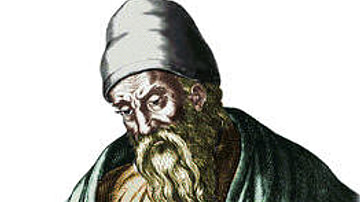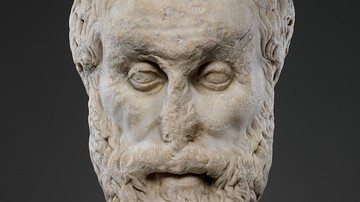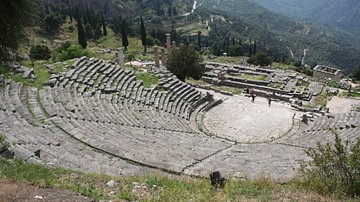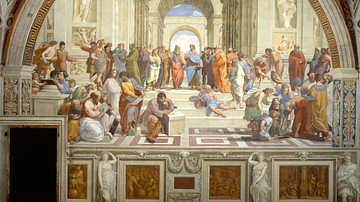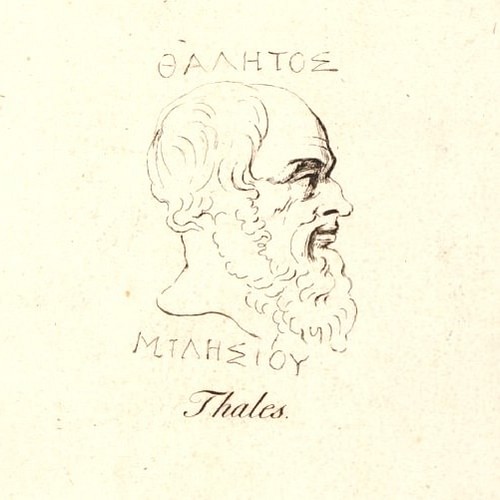
Thales of Miletus (l. c. 585 BCE) is regarded as the first Western philosopher and mathematician. He was born and lived in Miletus, a Greek colony in Ionia (modern Turkey) referenced as the birthplace of Greek Philosophy because of his high standing as the First Philosopher, a title given him by later Greek writers on the subject.
The philosopher Aristotle (l. 384-322 BCE) was the first to call Thales the "First Philosopher" for his systematic approach to enquiry and his claim was accepted because all of his pronouncements were regularly regarded as accurate. What Thales' approach was, however, is unclear as none of his works have survived - what is known of his philosophy comes from fragments of his preserved in passages by later writers – but all are in agreement that he pioneered the intellectual movement which later would become known as Greek philosophy.
He is said to have accurately predicted the solar eclipse of 28 May 585 BCE and was known as a skilled astronomer, mathematician, statesman, engineer, and sage (listed as one of the Seven Sages of Greece). He is regarded as the inventor of Greek Mathematics based on his introduction of geometry to Greece and for mathematical innovations such as Thales' Theorem used to find the center of a circle, among other applications. Although it is acknowledged that Thales derived this theorem from Babylon (and some sources attribute it to Pythagoras), it is generally believed that Thales more fully developed the Babylonian concept which was later used by Pythagoras.
Thales, it is said, was the first to ask the question, “What is the basic 'stuff' of the universe” and, according to Aristotle, claimed the First Cause was water because, among other attributes, water could change shape and move while still remaining unchanging in substance. His claims were innovative as he eliminated the traditional theistic explanation for any given phenomena.
Thales' inquiry into the nature of reality and first causes should have posed significant challenges to the ancient Greek religion which maintained that the world was created by the gods through supernatural means. There is no evidence that he was ever persecuted for his work, however, and, on the contrary, seems to have been highly regarded.
Based on the fragments of his work which survive, he seems to have been accepted, and respected, by his contemporaries because he never denied the existence of the gods, he only proposed a single, first element which could be interpreted as that which the gods would have worked with as water was already recognized in Greek cosmology as the element surrounding the earth in the form of the river Oceanus.
Thales' pragmatic and empirical approach to the subject, however, which stripped creation of its supernatural aspects to focus on the observable world, initiated the application of rational thought which was then pursued by others (known as the Pre-Socratic Philosophers) until its full development by Socrates (l. 470/469-399 BCE), Plato (l. 424/423-348/347 BCE), Aristotle, and all those who followed in the disciplines now given as ancient Greek Philosophy, ancient Greek science, and ancient Greek Mathematics.
Early Greek Religion
According to the Greek writer Hesiod (l. 8th century BCE) in his Theogony, the world (personified as the goddess Gaia) emerged from a swirling chaos of nothingness, fertilizing herself and giving birth to the sky (the god Uranus) who then impregnated her with the entities known as the Titans, six male and six female. Afterwards, Gaia would also give birth to the Cyclops (the one-eyed ones) and the Hecatonchires (hundred-handed ones) both of which displeased Uranus and were thrown into the dark underworld prison of Tartarus.
Gaia, outraged at Uranus' actions, convinced her Titan son Cronus to kill him, which he did by castrating his father. Afterwards, concerned that the same might happen to him, Cronos swallowed each of the children born to his sister-wife Rhea until the birth of her son Zeus whom she hid, feeding Cronus a stone wrapped in the newborn's blankets. Zeus grew up in a cave on the island of Crete and, upon attaining manhood, returned to overthrow Cronus, forcing him to vomit up Zeus' older siblings, killed him, and established himself as King of the Gods. He and his brothers and sisters then ruled the world, a kind of disc encircled by the waters of Oceanus, from their home on Mount Olympus after creating humanity.
By the time Thales was born, the stories concerning the anthropomorphic gods had become a highly developed belief system in which these gods were thought to interact with humans on a daily basis, were responsible for the maintenance and preservation of the world, and were interested in the personal lives and ethical choices of their human creations. Temples were raised in the honor of various deities in the pantheon, a clergy was developed, and rituals became standardized. There was, therefore, no reason to search for an origin of the world because this was clearly explained by religious belief.
Thales, Babylon, and Egypt
One of the perennial questions regarding the development of Thales' thought has been how he was first inspired to pursue it considering the intellectual climate in which he was raised. Philosophy usually develops only when religion fails to answer people's needs and, by all accounts, the early religion of the Greeks did so. It seems, however, that Thales was inspired in his pursuits through study in Babylon. The Babylonians held to a long-standing belief that water was the first principle and underlying form of existence and Thales would have picked up this concept from them.
The scholar George G. M. James, however, claims that Thales developed his ideas from the Egyptians with whom he is also supposed to have had contact. James writes:
Both history and tradition are silent as to how Thales arrived at his conclusions, except that Aristotle attempts to offer his opinion as a reason: that is that Thales must have been influenced by the consideration of the moisture of nutriment, and based his conclusion on a rationalistic interpretation of the myth of Oceanus. This, however, is regarded as mere conjecture on the part of Aristotle. (55)
James suggests that Thales took the idea of water as the first principle directly from Egyptian religion which maintained that the earth arose from the primordial seas of chaos. The god Atum, (accompanied, in some versions of the story by the god Heka, goddess Neith, or others) stood on a small hill of earth known as the ben-ben and created the ordered world from this watery chaos. James could well be correct in that it is entirely possible that a young, affluent, and intellectual youth such as Thales may well have studied in Egypt as well as Babylon or, just as likely, acquired his knowledge of the Egyptian creation story from the Babylonians who traded regularly with Egypt.
There seems to be no subject which was not of interest to Thales but, according to Aristotle (in his Metaphysics) he was chiefly concerned with the First Cause - that from which all else came - and declared it to be water. As noted, however, how he arrived at this conclusion is not adequately explained by the culture of his time. The majority of Western scholars reject the claims of Egyptian or Babylonian influence and insist that Thales' thought was completely original and derived from the ancient Greek paradigm of the universe and this has informed the standard interpretation of the origins of Greek philosophy, but this interpretation may be wrong.
Aristotle and Others on Thales
However he arrived at his conclusions, Thales maintained a pragmatic view of the creation of the world which had nothing, necessarily, to do with the gods. He chose water as the first principle because he noted that water became steam when heated while, when compacted with earth, it became slime and, if sufficiently cooled, it became ice. Water, then, was the underlying form of observable reality.
According to Aristotle and other writers of antiquity, Thales was regarded as an original thinker as his water theory does not bear a close relationship with the Greek mythological assertion which holds that the gods created the earth, including the element of water. While Thales does assert, as the Greek myth does, that the earth rests on water, Thales' theory dismisses any supernatural causes for this state of being. For Thales, there were practical, provable, logical reasons for why things happened, and the gods had nothing to do with observable phenomena.
With this in mind, it is interesting to note that another of Thales' famous claims was that "All things are full of gods." In his De Anima, Aristotle writes:
Thales, too, to judge from what is recorded of his views, seems to suppose that the soul is in a sense the cause of movement, since he says that a stone [magnet, or lodestone] has a soul because it causes movement to iron. (405 a20-22)
What, exactly, Thales meant by this statement is unclear but it has been suggested, and is probable, that by gods he simply meant energy but that Aristotle, and others, later re-interpreted Thales' statement according to the common understanding of the Greek word theoi as meaning “gods”. Thales might have been using that term in an entirely new sense, however.
The claim that Thales' “gods” are actually “energy” is a modern interpretation, but it does seem probable in that Thales' philosophy is routinely practical and based on observable phenomena. He seems to have held office, was employed as an engineer by King Croesus of Lydia (r. 560-547 BCE), and was recognized for his skill in astronomy. Scholar Forrest E. Baird notes:
Like many other Pre-Socratics, Thales was by no means a philosopher only. He was also a statesman, an astronomer, and a sage. (8)
When he was in Croesus' service as an engineer, he is said to have made it possible for the Lydian army to continue its march by redirecting a river. According to Herodotus:
When he came to the Halys river, Croesus then, as I say, put his army across by the existing bridges; but, according to the common account of the Greeks, Thales the Milesian transferred the army for him. For it is said that Croesus was at a loss how his army should cross the river, since these bridges did not yet exist at this period; and that Thales, who was present in the army, made the river, which flowed on the left hand of the army, flow on the right hand also. He did so in this way: beginning upstream of the army, he dug a deep channel, giving it a crescent shape, so that it should flow round the back of where the army was encamped, being diverted in this way from its old course by the channel, and passing the camp, should flow into its old course once more. The result was that, as soon as the river was divided, it became fordable in both of its parts. (Histories, I.75)
Aristotle tells the story of how Thales proved to his contemporaries the practical use of philosophy:
When they reproached him because of his poverty, as though philosophy were no use, it is said that, having observed through his study of the heavenly bodies that there would be a large olive crop, he raised a little capital while it was still winter, and paid deposits on all the olive presses in Miletus and Chios, hiring them cheaply because no one bid against him. When the appropriate time came there was a sudden rush of requests for the presses; he then hired them out on his own terms and so made a large profit, thus demonstrating that it is easy for philosophers to be rich, if they wish, but that it is not in this that they are interested. (Politics,1259a)
The practical application of philosophy as a tool of reason attracted the attention of young intellectual males who became Thales' students. In time, Thales founded the Milesian School which, today, would equate with a private college at which young men could pursue a course of study in debate, investigation, and exploration of the world around them. While there is no evidence that Thales was an atheist or that he taught atheism, there is ample evidence that the traditional understanding of the gods had no place in his teachings. His most famous pupil, Anaximander (l. c. 610-c.546 BCE) carried on this rational approach to inquiry, rejecting traditional Greek theological explanations, as did Anaximenes (l. c. 546 BCE) also of the Milesian School, after him.
Conclusion
Among his many achievements, Thales is said to have discovered Ursa Minor, studied electricity, developed geometry, contributed to the practical application of mathematics later developed by Euclid, developed a crude telescope, `discovered' the seasons and set the solstice, created what would later be known as `natural philosophy', and was recognized, along with illustrious men like Solon, as one of The Seven Sages of Ancient Greece, first mentioned in Plato's dialogue of the Protagoras.
Thales is said to have died of old age while attending a sporting event. According to the later Greek writer Diogenes Laertius (3rd century CE):
This wise Thales died while present as a spectator at a gymnastic contest, being worn out with heat and thirst and weakness, for he was very old, and the following inscription was placed on his tomb: You see this tomb is small—but recollect, the fame of Thales reaches to the skies. (Life of Thales)
While later philosophers disagreed with Thales' claim that water was the First Cause and basic substance of the universe, his work inspired those who would come to be known as the Pre-Socratic Philosophers to pursue their own paths and develop their own philosophical systems which would finally culminate in the vision of Socrates as interpreted and developed by his student Plato and resonate far beyond the world of ancient Greece to inform the totality of Western philosophy and influence philosophical systems around the world.

